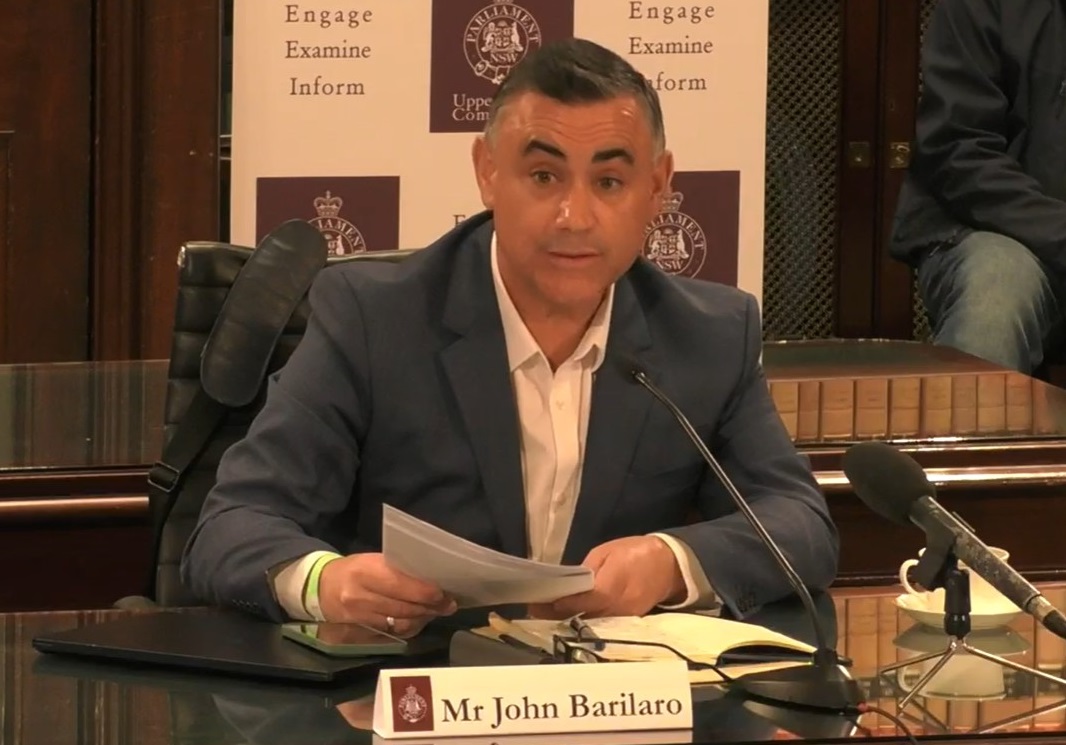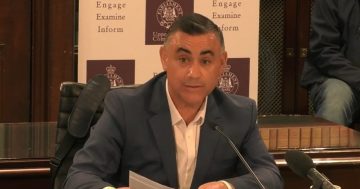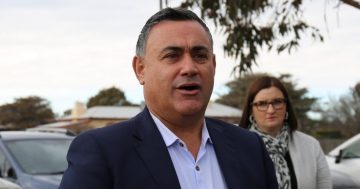
John Barilaro faced the parliamentary inquiry into how he received the STIC Americas appointment. Image: Screenshot.
A NSW Parliamentary Committee has released its final report into the Senior Trade and Investment Commissioners (STIC) selection process, which found that John Barilaro “inappropriately interfered” with the merit-based process.
Committee chair Cate Faehrmann said the former Deputy Premier and Monaro MP had meddled in the Agent General UK and STIC Europe and Israel (Agent General UK) selection process.
“[He did this by] failing to meet with the preferred candidate and instead directly approaching [eventual successful candidate] Stephen Cartwright and soliciting his candidacy,” she said.
“The former Deputy Premier acted inappropriately and displayed poor judgement which, ultimately, influenced the appointment process.
“A preferred candidate was initially identified and the public service proceeded to work towards their appointment, only for them to be discarded and replaced with another candidate introduced by then Deputy Premier John Barilaro.”
This was despite Mr Barilaro’s office receiving and responding to an email that a “final preferred candidate”, Paul Webster, had been found in early January 2021.
Both recruitment panel chair Michael Pratt and former NSW Treasury Trade and International Deputy Secretary Jenny West said during their testimony the selection panel was concerned Mr Webster didn’t have enough experience to step up to such an important role.
During his testimony, Mr Cartwright said Mr Barilaro had brought up the job during a coffee meeting on 17 February 2021.
“[T]he Deputy Premier asked me if I might be interested in the UK Agent General role,” he said.
“I was taken by complete surprise by his question because I had not heard much about the role since it had been announced [in 2019].”
They met again the next day, during which Mr Cartwright said Mr Barilaro outlined the next steps of the recruitment process.
“He then made it clear during the meeting that he would immediately let the external recruiter know of my interest, that there was an established independent recruitment process to be followed and that he would not have any further involvement in the process,” Mr Cartwright told the committee.
“I was comfortable with this, and I never once contacted him, spoke to him or heard from him again during the five-month recruitment process.”
Mr Pratt also stressed there was no interference from Mr Barilaro once Mr Cartwright began the recruitment process.
“Once the referral was made, it’s up to the panel, and we’re prepared to put him through a process … it was made clear to the Deputy Premier that he was to have no engagement in the assessment process,” he said.
“And to my knowledge, he absolutely honoured that.”
Mr Cartwright applied for the position on 22 February 2021. He was ultimately appointed on 26 July of the same year.
While Mr Pratt ended up securing the Trade and Investment Commissioner UK and Europe role, effectively working as Mr Cartwright’s “second in command”.
Mr Barilaro also discussed remuneration expectations with Mr Cartwright before he applied for the job.
The committee found this influenced both Mr Cartwright’s “high salary expectations” and his view that Mr Barilaro led the appointment process.
“The committee also found that Mr Cartwright repeatedly and inappropriately applied pressure to senior public servants to improve his personal remuneration,” Ms Faehrmann’s report foreword stated.
“It was wrong that the Department of Enterprise, Investment and Trade agreed to adjust Mr Cartwright’s remuneration, which resulted in a poor financial outcome for the State of New South Wales.”
In light of this pressure, the committee has recommended Mr Cartwright be investigated to see if he has abided by the code of conduct applicable to his role.
The committee heard that on 31 March, Mr Cartwright had emailed NGS Global managing partner Dr Marianne Broadbent who was handling salary negotiations.
He told her he had spoken with Mr Barilaro about what kind of pay he could expect, given he had been earning more than $800,000 in his previous role.
“Apart from improving the base package (he mentioned low 5’s), he indicated (privately of course) that he and the Treasurer had reached an agreement that the cost of suitable family accommodation (including cleaning etc) in an inner suburb of London could be taken care of … outside of the salary package,” he wrote.
“I don’t want to directly disclose my discussions with the [Deputy Premier] etc, or be accused of being unrealistic or playing hard ball in the negotiations, but my participation in the process to date has been shaped by these expectations and I can’t hold off other offers for too much longer so I need a degree of certainty on this role asap.”
At the time, the remuneration for all STIC positions was equivalent to a grade three senior executive, with a maximum salary of $487,000, plus a cost of living allowance where applicable.
Mr Cartwright received the maximum salary paid in local (UK) currency, along with a cost of living allowance of $112,950 from 31 January to 5 July 2022, which was changed to $11,839.89 from 6 July as Investment NSW started paying his rent directly to his landlord monthly (a cost of $101,111.11 per annum).
The NSW Government also took care of the tax payable on this fringe benefit to the tune of about $107,859 per annum.
There was also a one-off reallocation allowance capped at $60,000.
As occurred with the interim report into how Mr Barilaro received his STIC role, committee members Wes Fang (Nationals MLC), along with Liberal MLCs Scott Farlow and Taylor Martin, issued a dissenting statement.
They said the report was nothing but a “politically motivated hit job” from a “desperate Labor-Greens coalition”.
“This is a desperate attempt by the Committee to make up facts to suit their agenda weeks out from an election,” their statement read.
“[This report’s] findings should be rejected.”














